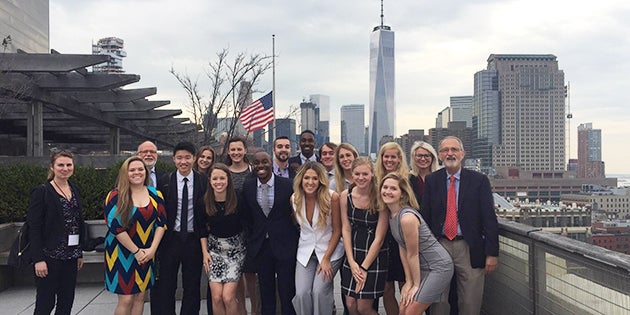By Becca Starkes
Spring Break is often considered a time to soak up the sun, frolic in cool ocean waves, and catch some Z’s. While many of my classmates were doing just that, I was navigating my way through two of the country’s biggest cities — Washington, D.C. and New York City — to learn from and network with professionals at several high-profile companies. I came away from the trip, which is organized annually by the Department of Communication, with dozens of valuable insights from executives and other professionals.
I’ve boiled this list down to six of the most important takeaways, and I’m convinced they can help any soon-to-be graduate (like me) in the search for the elusive first “real job.”
1. Know yourself and what you want.
It’s not always as easy as you think (just ask any graduating senior). Often we have suggestions hurled at us from our loved ones and even complete strangers. While this pressure can sometimes be overwhelming, it will make you happiest in the long run to do what you want and know you can do. Otherwise, you’ll waste time satisfying others at the expense of your own happiness. You know yourself better than anyone else. Sometimes you just have to cut through the noise and trust your gut.
2. Do your research.
Use LinkedIn, informational interviews, or anything else at your disposal to research the industries, companies, and positions you’re interested in. Look up people on LinkedIn who work in your industry and contact them for more information. But, as one professional commented, don’t contact someone asking for a job or internship. Instead, tell them you think they have a cool job and you’d like to learn more. They might be more likely to reply.
3. Network, network, network.
We heard this over and over (and over) again at every site on the trip. Contrary to the beliefs of many undergraduate students, networking isn’t just about walking up to people and handing them your resume at a career fair. It means building relationships with your contacts over time. Do networking right and it could make an incredible difference in your career. Professionals who are “in the know” about opportunities are far more likely to tell their friends and close business contacts than someone they hardly know. So, make yourself some friends. Tap into the vast network of CofC alumni — over 60,000 around the world — who are doing great things in just about every industry you can imagine. Use the Career Center’s alumni and student career network group on LinkedIn or, once you graduate, use MyCofC to find fellow graduates.
4. Know your achievements and don’t underestimate your skills.
If you act like you have no experience, hiring managers have no choice but to agree. Be your own advocate. Have you done internships or held leadership positions on campus? Great. If not, describe class projects — especially those dreaded group ones — as lessons in working with a team or performing self-directed research. Need help figuring out which of your experiences translate to professional skills? See someone at the Career Center for one-on-one assistance.
5. Take the job closest to what you think you want.
This doesn’t mean you should plan on getting your dream job immediately after graduation. But it does mean you shouldn’t settle for the first job you come across. Do some research and apply for positions that genuinely interest you. That way, when you get the job, you can spend your time there learning if that career path is truly a good fit. If not, you still gained some experience that will help you get where you want to go.
6. Have goals, but understand they will likely evolve.

Bruce Haynes, president and founding partner of Purple Strategies (a strategic communications firm) talks with students from the College.
This one was, by far, my favorite piece of advice on the whole trip. In college, we often think that there’s a straight path from your first job to your last job and that, if we don’t strictly follow the path, we’ll fail.
The truth is that few people end up doing what they thought they would when they graduated — and that isn’t necessarily a bad thing. They learned new skills, were exposed to different opportunities, and made new connections along the way that influenced their goals. You should definitely have a plan for your early career, but if and when it changes, don’t worry. Keep an open mind, work hard, and do what feels right. Everything else will fall into place.
This article was written by Becca Starkes, a senior from Myrtle Beach, S.C., majoring in communication at the Honors College at the College of Charleston. She is also on the executive board of the Student Alumni Associates.






